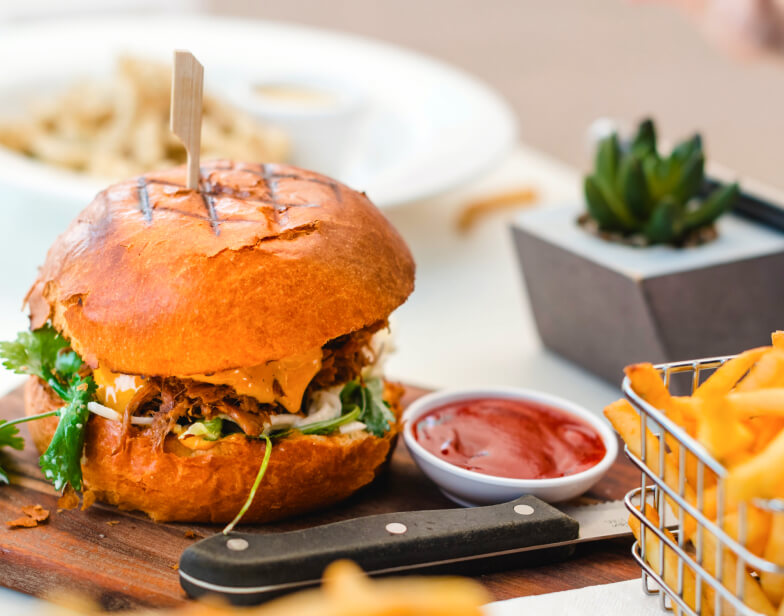Soul Food, Heritage, and Johnnie Mae's
The Roots of Soul Food: From Tradition to Togetherness

The Roots of Soul Food — and Why It Matters to Memphis
Soul food is more than a menu. It’s memory, music, and the magic of a shared table. In Memphis, where neighborhoods hum with church choirs and Beale Street blues, soul food connects generations and turns everyday meals into moments that feel like home. At Johnnie Mae’s, that’s what we serve: not just plates, but a living tradition.
What “Soul Food” Means
The phrase “soul food” rose to prominence in the 1960s as a celebration of Black culinary identity, creativity, and pride. It’s a style rooted in Southern home cooking, shaped by family knowledge, church gatherings, and community hospitality.
Dishes like fried chicken, slow-simmered greens, black-eyed peas, cornbread, candied yams, and sweet potato pie tell stories of ingenuity and care — recipes refined across kitchens and church basements, then carried to cities nationwide during the Great Migration.
Culinary historian Adrian Miller even describes soul food as “the immigrant cuisine” of Southerners who moved and made it their own in new places.
How the Tradition Grew and Traveled
As millions of Southerners settled in new cities, they brought their cooking with them — establishing restaurants, social clubs, and church suppers that preserved flavor while adapting to new markets and ingredients. Archives and oral histories from organizations like the Southern Foodways Alliance document how these meals functioned as cultural anchors, community fundraisers, and neighborhood touchstones.
Meanwhile, museum curators and scholars have helped codify the style. The Oxford Encyclopedia of Food and Drink in America traces the vocabulary and techniques of regional American cuisines, including entries on African American foodways, while the National Museum of African American History & Culture highlights signature dishes, regional variations, and contemporary interpretations at venues like Sweet Home Café.
Why Soul Food Matters to Memphis
1) It’s our community table.
Sunday plates, repasts, and potlucks have long been where Memphis neighbors gather — to check in, lift spirits, and celebrate milestones. Food is the invitation; fellowship is the purpose. Churches and community centers across the city still use food to organize, fundraise, and welcome newcomers.
2) It carries our sound and story.
Memphis is a music town, and soul food shares that rhythm — layered, improvisational, and deeply felt. From kitchen to choir loft to club, a plate of hot sides and a slice of pie feel like a chorus everyone knows.
3) It keeps local traditions alive (and delicious).
Memphis puts a distinctive stamp on Southern flavor: bold seasoning, balanced sweetness, and smoke-kissed notes that show up in everything from greens to poultry. Foodways research and oral histories make clear that these traditions persist because they’re delicious and meaningful.
4) It gives back — and looks forward.
Today’s soul food scene embraces freshness, regional produce, and inclusive options, without sacrificing comfort. National institutions spotlight this evolution — you’ll see classic mains alongside vegan sides, seasonal vegetables, and lighter preparations. That spirit aligns with how we cook at Johnnie Mae’s: honoring the canon while welcoming thoughtful updates.
What You Taste at Johnnie Mae’s
- Care you can feel. Slow simmering, hand seasoning, and house-made sides because time is an ingredient.
- Heritage on the plate. Recipes refined through family tradition and Memphis know-how.
- Hospitality first. A warm greeting, a full plate, and space to linger with people you love.
Memphis, This Is Your Invitation
Soul food thrives because Memphis shows up for it — at church dinners, block parties, reunions, and weeknight suppers that turn into story time. Every time you sit with us, you help keep a tradition vibrant, delicious, and welcoming to the next generation.
Pull up a chair at Johnnie Mae’s. Taste the roots, feel the rhythm, and join the community that makes Memphis, Memphis.
Visit johnnie-mae.com to plan your next meal, or stop by and let us serve you something that tastes like home.
References & Further Reading
- Adrian Miller on the history of soul food and migration — Duke Sanford Center:
https://wfpc.sanford.duke.edu/podcasts/adrian-miller-history-soul-food/ - The Soul Food Scholar: An Interview with Adrian E. Miller — African American Intellectual History Society:
https://www.aaihs.org/the-soul-food-scholar-an-interview-with-adrian-e-miller/ - Southern Foodways Alliance — Homepage:
https://www.southernfoodways.org/ - Southern Foodways Alliance — Oral History Archive:
https://www.southernfoodways.org/oral-history/ - Oxford Encyclopedia of Food and Drink in America (archival copy):
https://archive.org/details/oxfordencycloped0000unse_c7e6 - National Museum of African American History & Culture — Foodways Overview:
https://nmaahc.si.edu/foodways - NMAAHC — Sweet Home Café and regional menu interpretations:
https://nmaahc.si.edu/visit/sweet-home-cafe - University of Memphis thesis on Memphis food networks (civic and church roles):
https://digitalcommons.memphis.edu/cgi/viewcontent.cgi?article=3597&context=etd




